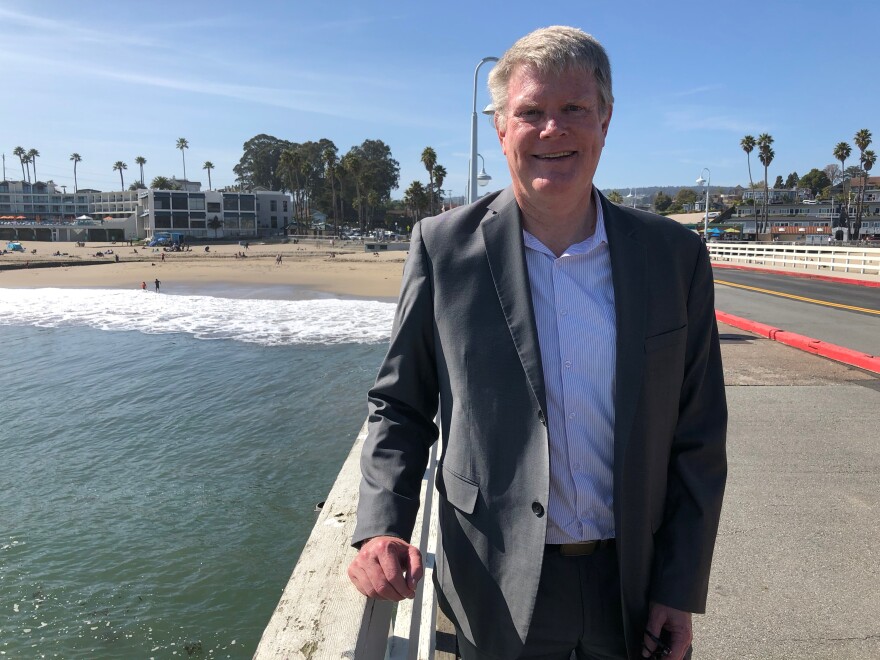Earth day will bring out volunteers for beach clean ups this Sunday. The one thing they’ll likely be picking up the most is cigarette butts.
It’s a fact that has long bothered State Assembly Member Mark Stone who represents the Monterey Bay Area. This year is the third time he’s proposed legislation to make cigarettes sold in California filter-less (AB 2308).
The idea of a cigarette butt ban has not been well received in Sacramento. But he’s still pushing it. I met Assembly Member Stone at the Santa Cruz Wharf. He says he wants to reduce plastic pollution in the ocean.
Mark Stone (MS): The plastic filter itself does absorb some of the toxins and the chemicals from the smoke, and so that plastic item then becomes a little toxic bomb in the environment. It's very pervasive. It doesn't break down. It doesn't go away. It's eaten by fish, eaten by birds, eaten by mammals, and it is then problematic.
Krista Almanzan (KA): And I know you site research that there's no health benefit of the filter. But how can that not be a benefit if there's toxins in it and it's harming wildlife?
MS: Literally all of the research shows that health outcomes don't change filter or no filter. So yes the filter does absorb some of the toxins, but smokers with filters tend to take the smoke more deeply in the lungs and get different kinds of cancers. Removing the filter has absolutely no health outcome on the smoker, but yet could have a significant environmental outcome when the smoker tosses it away.
KA: It sounds a bit like a litter problem more than a cigarette problem. So why target this one piece of litter for change?
MS: Yes it's a litter problem. But when you realize that throwing a cigarette away is a potential of a thousand dollar fine. It already is a significant fine. That doesn't dissuade anybody from smoking and tossing. And they all say this, “I smoke. I toss. That's what I do.” That's not going to change. And so I don't think we're going to be able to change behavior. We could make the fine five thousand dollars. I don't think that that nexus between the value of the fine and the offense would stand constitutional scrutiny, so there's only so much we can do to address it as a litter problem. And given the admitted behavior of most smokers let's just make what they toss less harmful.
KA: You introduced this in 2014 and it got voted down in that committee. And then in 2015 when you reintroduced, it didn't get a hearing. What are you hearing from your colleagues that they don't like this idea?
MS: Well the chair of the committee that it went to in the first instance didn't like it. We ended up with a couple of votes. And no matter how I explained it the then chair said, "my father smokes. You mean you want to make the product more dangerous for my father" and I could not convince him. All of the research that's been done did not convince him that it was not making it any less harmful. He couldn't get over it. Second time I introduced that in 2015. The chair didn't like it. He told me he didn't want committee members of that committee having to vote on something. The tobacco industry spends a lot of money on that chair and on a number of members of the legislature, and they would had to have made a choice between the tobacco money and their constituents. So that to me is a false choice and inappropriate. Our job is to introduce bills that we think are appropriate. And our job as committee chairs is to hear them even if we don't like them.
KA: What do you think will be different about 2018 this third time you introduce it?
MS: I think the committee make up a little bit different. I don't know for sure that I'll be able to get it out of the committee, but at least I'm expecting to get a few more votes for it. And by getting some more votes showing that more of my colleagues are interested in it, and sometimes these ideas need a few iterations and a few times to get people used to the notion that it doesn't seem so foreign. The first year I ran it I was met with a lot of blank stares and not even an understanding of the problem. And that's when more my colleagues were coming back and said You know I see what you mean now that cigarette butts are everywhere. And by drawing some attention to it getting people to see it and knowing that there is in fact a reasonable solution to that particular problem. It's worth the conversation.
Assembly Member Stone’s proposal to ban cigarette butts goes before committee in early May.
He has also proposed a second piece of legislation targeting another piece of trash commonly found in beach clean ups: plastic bottle caps (AB 319). That would require all single use plastic bottles to have the lid attached.


